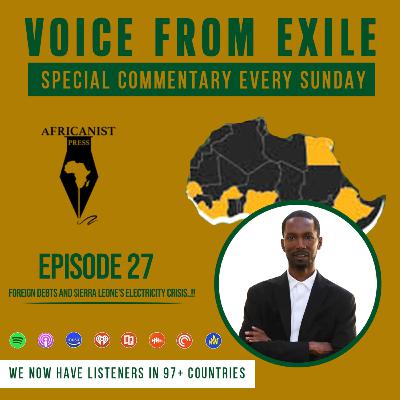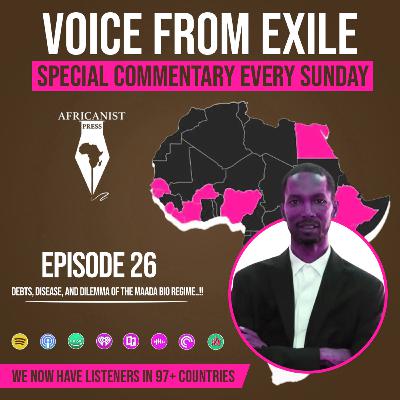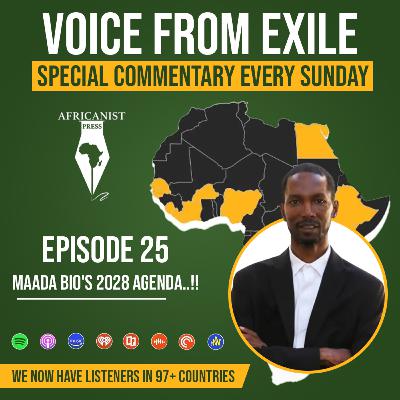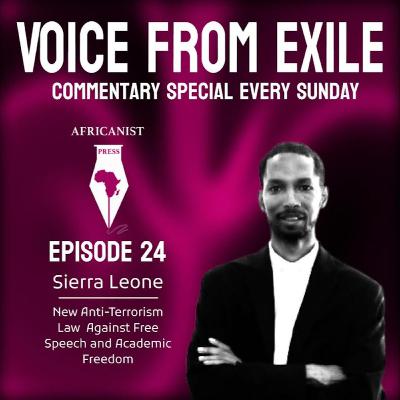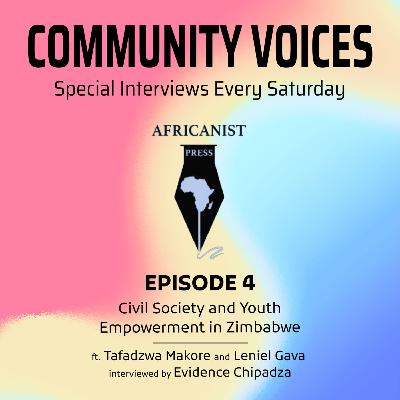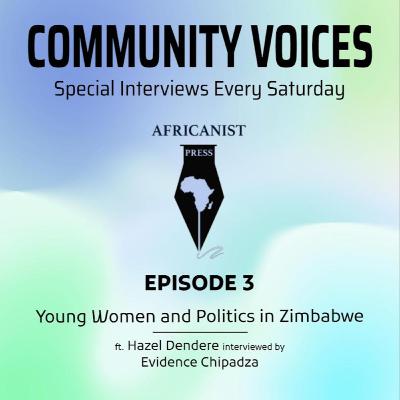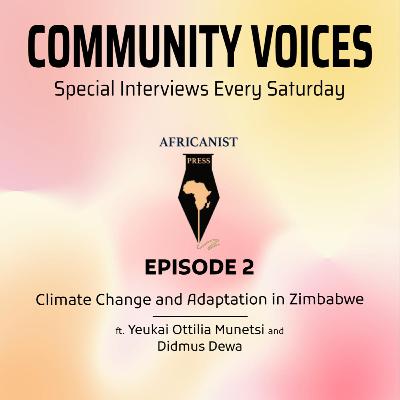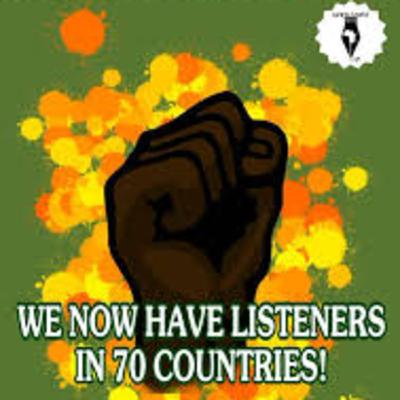Discover Africanist Press Podcast Service
Africanist Press Podcast Service

Africanist Press Podcast Service
Author: The Africanist Press
Subscribed: 16Played: 99Subscribe
Share
© The Africanist Press
Description
The Africanist Press Podcast Service examines how global and continental events have affected communities in the African region, and how indigenous communities are developing strategies to overcome conflict, instability, and other challenges in the region. The overall goal of the Podcast Service is to give voice to marginalized communities through the production of weekly audio broadcasts that analyzes ongoing events in Africa as part of an effort to contribute to better understanding of key developments in the region.
68 Episodes
Reverse
In this episode, Dr. Chernoh Alpha Bah, editor of Africanist Press, discusses the ongoing political crisis in Sierra Leone, focusing on issues of accountability, extrajudicial killings, and the recent resignation of U.S. Ambassador Bryan David Hunt, whose involvement in local politics has raised concerns amongSierra Leoneans.The conversation also delves into the implications of foreign debts, particularly from the U.S. International Development Finance Corporation (DFC), and the lack of progress on a promised power plant project in Freetown, raising questions about the use of development funds and the need for transparency and justice in Sierra Leone.This episode is part of our "New Democracy Project," sponsored by Northwestern University's Program of African Studies, Write4Justice and SolidarityForAfrica campaigns.
In this episode, we explore Sierra Leone's political landscape, focusing on the crisis marked by corruption, extrajudicial killings, and ongoing debt and development challenges since Maada Bio took office in 2018. We highlight the implications of these human rights violations for the 2028 elections and the future of democracy in the country.
In this episode, we discuss the increasing legitimacy crisis facing the Maada Bio regime in Sierra Leone. We examine the regime's agenda as it prepares for the upcoming 2028 elections. Additionally, we highlight why the 2028 elections pose a significant challenge to the political and elite alliances that have maintained power in Sierra Leone since 1961.This episode is part of the Voice from Exile series of the Africanist Press.
Sierra Leonean politicians have created a new anti-terrorism law that contains unconstitutional provisions designed to curtail citizens’ fundamental civil rights.
In this episode, we examine the law's implication for free speech and multiparty democracy in Sierra Leone.
This episode is part of the Voice from Exile series.
Sherbro Island is one of Sierra Leone’s most beautiful touristic landscape. In 2019, the Maada Bio regime signed an undisclosed Memorandum of Understanding (MOU) with Sherbro Alliance Partners, a company incorporated in early June 2019 as a private limited company (#12040217) under the UK Companies Act 2006 by Idris Akuna Elba and Siaka Stevens, the grandson of Sierra Leone's first president.
The non-disclosed agreement proposed to incorporate and establish Sherbro Island into an autonomous economic zone to be governed by a 7-person board of directors who will have sovereign powers to manage Sherbro Island as a distinct legal entity independent of Sierra Leone's financial and economic laws and regulations. The agreement also grants exclusive powers to the proposed authority to establish its own private security, air and sea transport arrangement, its gambling infrastructure, agriculture and health, and the ability to issue its own debt securities and financial markets.
However, the details of this agreement have not been made public to Sierra Leoneans.
In this episode, we examine the proposed privatization of Sherbro Island and its planned transformation into a “Casino Republic” in Sierra Leone. We highlight the legal and political implications of the proposed takeover of Sherbro Island by multinational corporations.
This episode is part of the Voice of Exile series of the Africanist Press.
Few days ago, the United States Department of Justice (DOJ) issued an indictment against executives of the Adani Group for orchestrating a massive bribery scheme to secure solar energy contracts worth billions of dollars in India.
The indictment specifically states that, between July 2021 and February 2022, the Adanis and their associates promised bribes to Indian government officials to secure agreements with state-run electricity distribution companies, which in turn entered into power supply agreements with the Solar Energy Corporation of India (SECI). The contracts were expected to generate profits of approximately US$2 billion over the next two decades, according to the petition.
However, a year ago in November 2023, Adani (like Milele Energy in Sierra Leone) received US$553 million debt financing from the United States International Development Finance Corporation (DFC) to fund the Colombo Port Terminal in Sri Lanka, a project in which the Adani Group held 51% ownership.
In Sierra Leone, Milele Energy similarly received over US$400 million in DFC debt financing for a corruptly awarded energy project in Freetown. The contract relating to the Western Area Power Generation Project was never advertised or put on a public tender, and was secretly awarded to Milele Energy executives by Julius Maada Bio following deal arrangements and negotiations brokered in Lebanon, Nairobi, Dubai, and Freetown between 2021 and 2023.
In this episode, we ask what are the implications of the Adani Group indictment for Milele Energy's corrupt acquisition of Sierra Leone's Western Area Power Generation Project? Also, what is the relationship between the Adani Group corruption case and our ongoing efforts to scrutinize corrupt acquisition of critical infrastructure and service related contracts by US financed corporations in Sierra Leone, including Milele Energy and the Summa Group?
Thus, we point out the need to investigate DFC's operation in Sierra Leone from 2021 to present.
This episode is part of the Voice from Exile series of the Africanist Press.
This episode spotlights the life and contributions of South African revolutionary leader, Stephen Bantu Biko to the Black Consciousness Movement and the struggle against Apartheid.
This episode examines how World Bank's debts, and high interest rates, cripple African and Asian economies, deepening poverty and underdevelopment in the world's most impoverish countries.
This episode is based on John Pilger's 1992 award-wining documentary, War by Other Means.
This episode honors the life and work of John Pilger, who passed away in December 2023.
About a month ago, the United States International Development Finance Corporation’s (DFC) Deputy Chief Executive Officer, Nisha Biswal, attended a ceremony in Freetown to launch the “construction of an electricity infrastructure” in Freetown’s Kissy Dockyard, 4km east of the city center.
US Ambassador to Sierra Leone, Bryan David Hunt and DFC executives described the launching ceremony as “a seminal development for Sierra Leone and an unprecedented one for the US government.” They stated that the proposed energy power plant is going to be the “largest increase in energy capacity in a single country of any prior DFC project.”
DFC is a US-government run “development finance institution,” established in 2019 as part of the Better Utilization of Investments Leading to Development Act (BUILD) 2018, which combined the Development Credit Authority Agency with the Overseas Private Investment Corporation, both formerly part of the US State Department Agency for International Development (USAID). DFC reports directly to the US Congress.
Several months ahead of Freetown launching ceremony, DFC executives and US Embassy staff in Sierra Leone have been repeating that up to $412 million in loans and risk insurance have been approved by the US government to provide finance and risk insurance for the project. Two foreign companies, Milele Energy and TCQ Power Limited are listed as co-sponsors and joint recipients of the $412 million loan (including $120m in risk insurance) for the construction of the said electricity infrastructure project.
TCQ Power’s controversial presence and involvement in Sierra Leone’s energy sector dates to the early 2010s, but
Milele Energy is a newcomer, arriving in Sierra Leone after the election of Julius Maada Bio in 2018.
In public communication documents, the DFC and the US Embassy in Sierra Leone present Milele Energy as an independent Kenyan-based power generation company, failing to reveal complete details of the company’s profile and real ownership; details that are required to enable public scrutiny of Milele Energy’s track record and whether it has a proven capacity to deliver on its contractual responsibilities.
Corporate records reviewed by Africanist Press shows that Milele Energy's corporate shareholders include Gemcorp Fund (GP) Limited, a company registered in George Town, Cayman Islands, holding the majority 80% shares in Milele Energy; Verkanda LLC registered in Delaware, US, also holding 10% shares in Milele Energy; JWI III LLC also registered in Delaware, US, holding 5% shares in Milele Energy; and Empower Africa Consulting Limited registered in Tortola, British Virgin Islands, holding 5% shares in Milele Energy.
There is no record of any competitive bidding and public tender process that Milele Energy and DFC went through to take over the Western Area Power Generation Project. Worse, Sierra Leoneans are also unaware of the loan conditions, including the interest rates attached to DFC’s development finance loans. DFC is yet to disclose the process used to issue the $412 million debt to the US owned company Milele Energy for the alleged purpose of building an electricity infrastructure in Sierra Leone.
In this episode, we examine Milele Energy’s corporate ownership and the DFC’s takeover of the Western Area Power Generation Project. We ask whether the DFC's operations in Sierra Leone complies with the provisions of the US BUILD Act of 2018? We also highlighted the need for oversight agencies of the US government (Congress and Senate Foreign Affairs Committee) to institute an independent investigation to help determine how Milele Energy and DFC took over the Western Area Power Generation Project, and the role played by the United States Embassy in Freetown in these corporate developments in Sierra Leone.
This episode is part of the VOICE FROM EXILE commentary series of the Africanist Press.
In this episode, we discuss the United States International Development Finance Corporation (DFC)'s acquisition of the Western Area Power Generation Project and the role of the US-financed company, Milele Energy in Sierra Leone's corrupt energy sector.
We ask, in particular, how Milele Energy Limited, and the United States Development Finance Corporation (DFC) took over the Western Area Power Generation Project and what are the legal and financial basis for the US$412 million debt financing they are imposing on Sierra Leone in the name of an electricity project whose viability remains highly questionable?
In addition to the above, we also ask whether the DFC's takeover of the Western Area Power Generation Project in compliance with the provisions of the US Build Act of 2018? What do the registration details, corporate records, and shareholders arrangements of TCQ Power Limited, Milele Energy Limited, and Milele Topco Limited tell us about the company's profile and transnational operations in Africa, Europe, Asia, and the Americas? What roles have the United States Embassy and British High Commission in Freetown played in these corporate developments in Sierra Leone in the last 15 years?
Most importantly, what is the relationship between Milele Energy's corporate network and Julius Maada Bio and other Sierra Leone Peoples Party politicians? And did Sierra Leone's Anti-Corruption Commission (ACC) play a role in these dubious corporate arrangements, and what benefits did the ACC derive from the DFC and Milele’s corporate operations in Sierra Leone?
This episode is part of the VOICE FROM EXILE commentary series of the Africanist Press.
In this episode, Evidence Chipadza discusses civil society and youth empowerment in Zimbabwe with Tafadzwa Makore and Leniel Gava.
This episode is part of the Africanist Press community voices series.
In this episode, Evidence Chipadza and Hazel Dendere discuss young women and politics in Zimbabwe.
This episode is part of our community voices series.
In this episode, Yeukai Ottilia Munetsi talks to Didmus Dewa about climate change and adaptation in Zimbabwe.
Didmus Dewa is a lecturer at the Open University of Zimbabwe.
This episode is part of the Africanist Press Community Voices series.
In this episode, Cornelia Seliphiwe talks about the impact of party politics on social service delivery and human rights in Gweru, Zimbabwe's midlands province.
This interview was conducted by Yeukai Ottilia Munetsi.
This episode is part of our new African community voices series.
How is United Sates foreign policy affecting democracy in Sierra Leone? What is the difference between electoral democracy and tripartite democracy? Is the United States Embassy in Sierra Leone supporting democracy or helping to consolidate an illegal regime?
In this episode, we discuss Sierra Leone's electoral coup of June 2023, and the ongoing international effort, led by the United States Embassy in Freetown, to validate an illegal regime in Sierra Leone despite a fraudulently organized election.
This episode is part of the Voice from Exile series of the Africanist Press.
Are there any parallels between the just concluded November 2024 United States elections and the June 2023 Sierra Leone elections? What lessons do the US elections offer to real democratic and genuine progressive forces in Sierra Leone?
In this episode, we provide an analysis of the just concluded United States elections, pointing out the lessons and implications for Sierra Leone's democracy , and why the outcome of any democratic election is never decided by tripartite agreements.
This episode is part of our ongoing Voice From Exile series of Africanist Press.
December 2024 will mark 22 years since the launch of the Africanist Press.
The Africanist Press was established by journalists and academics in December 2002 as an independent media organization to defend free speech, expose corruption, and promote democracy and development in Africa.
In 22 years, Africanist Press has grown into a robust media organization known internationally for its groundbreaking investigative journalism exposing corruption, human rights violations, and multinational exploitation.
In this episode, editor-in-chief Dr. Chernoh Alpha Bah discusses the enduring impact of the Africanist Press, and the planned expansion and official launch of a new Africanist Press multimedia initiative in December 2024 to commemorate the 22nd anniversary of the organization.
This episode examines how the International Monetary Fund (IMF) and World Bank's structural adjustment policies affected Jamaica’s economic and political development from the early 1970s to the present.
The IMF's loan conditions required Jamaica to implement a range of economic reforms that included trade liberalization, privatization, and deregulation of its market. This internationally regulated program resulted in Jamaica accumulating over US$4.6 billion in foreign debts.
In a 2001 documentary, Stephanie Black examined the devastating impacts of the IMF’s structural adjustment program in Jamaica, featuring a wide range of voices that included former Jamaican Prime Minister Michael Manley, and several workers in Jamaica's Free Economic Zones established by US multinational corporations to exploit cheap labor in the Caribbean.
Material for this episode was adapted from Stephanie Black's documentary, Life and Debt.
This episode examines three key events to illustrate how political corruption undermined Jamaica's development and fueled the country's debt crisis.
First, we look at how a US$9.5 million World Bank loan issued in 1966 to supposedly finance the construction of 50 junior secondary schools, expand four teacher training colleges, and develop Jamaica's School of Agriculture, and the College of Arts, Science, and Technology was misappropriated by Jamaican politicians and international contractors.
Next, we examine how Jamaica's 1994 "Operation Pride Program," a housing and land distribution initiative aimed to address access to housing and land for poor communities, was corruptly used to reward political party members and organizers, depriving the actual beneficiaries for whom the program was allegedly designed.
We conclude by looking at how finance companies used a Ponzi scheme investment operation to capture Jamaica's political elites and media. We use the Olint Scandal of the mid-2000s, and the extradition of Christopher "Dudus" Coke to illustrate the extent of state and media capture in Jamaica.
This episode is based on material produced by Jamaica's National Integrity Action (NIA), a non-profit organization established in December 2011 to address corruption in Jamaica from a non-partisan perspective.
Samora Machel was the first President of Mozambique, serving from the country's independence in 1975 until his untimely death in 1986.
A leading figure in the struggle for Mozambique’s independence from Portuguese colonial rule, Machel played a significant role in FRELIMO’s struggle for power in Mozambique.
As president, he embarked on socialist reforms and efforts to modernize Mozambique. However, his tenure was marked by economic difficulty, owing mostly to external interventions from the neighboring apartheid regime in South Africa, and a devastating civil war fueled by a western-backed insurgency led by RENAMO.
In 1986, Machel died in a mysterious plane crash in South Africa while returning to Mozambique from Zambia. Many accused South Africa’s apartheid government for the plane crash, although apartheid leaders continuously denied any involvement or knowledge of the fatal incident.
This episode features an exclusive report and testimony of a former South African Special Forces operative who allegedly participated in planning the assassination of Samora Machel.
Material for this episode was adapted from the 2011 Journeyman Pictures documentary, “Was Samora Machel Assassinated by a Conspiracy?”


